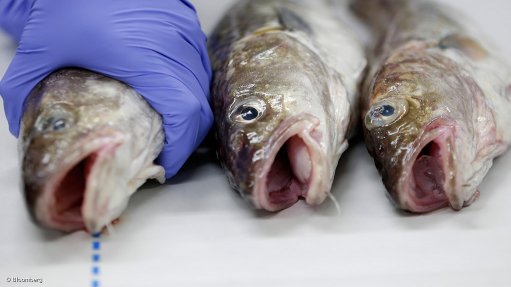
Photo by: Bloomberg
The Department of Agriculture, Forestry and Fisheries (DAFF) was one of 58 signatories to an anti-shark finning letter addressed to the CEO of the Marine Stewardship Council (MSC) in April 2019.
South Africa’s Department of Agriculture, Forestry and Fisheries (DAFF) one of 58 signatories of anti-shark finning sent a letter to Marine Stewardship Council (MSC).
MSC requirements prohibit shark finning, but the letter reveals inconsistent scoring of fisheries on this practice and certification decisions taken in absence of data.
Signatories from academia, retail, fisheries and NGOs, alongside DAFF, call for MSC to take measures to ensure shark finning policy is effectively enforced.
Shark finning, which kills an estimated 100 million sharks per year globally, is clearly prohibited by the MSC Standard which states that “… the Conformity Assessment Bodies [CABs] should not certify or maintain the certification of a fishery when there is objective verifiable evidence that indicates shark finning is taking place.”
The letter, coordinated by SharkProject and endorsed by organisations from around the world, outlines incidences related to a number of tuna fisheries where CABs are inconsistently applying the MSC Standard with regards to shark finning and have made determinations on the likelihood of the existence of finning in cases where the relevant data on finning, bycatch and/ or compliance has not been available. For example, the Parties of the Nauru Agreement (PNA) fishery, where there were 429 observed incidences of finning from 2012-2015 was awarded a score on the relevant indicator of 80 (meaning it is highly likely that no shark finning is taking place), while the Tri-Marine fishery, where there were 21 reported incidents, received 75 (meaning likely that no finning is taking place). Furthermore, the PNA was recertified in 2018 despite no data more recent than that of 2012-2015 figures being available.
Consequently, the letter highlights the discrepancy between the ban on shark finning and the way that it is being enforced and calls for a revision of the MSC certification to require a “fins naturally attached” policy and the application of a precautionary principle. The signatories note that the letter represents a constructive engagement and that they hope to work with the MSC to find solutions so that the scourge of shark finning is permanently eliminated from all MSC-certified fisheries.
Ms Siphokhazi Ndudane, Deputy Director-General: Fisheries Management of DAFF, said: “This letter highlights assessments from a number of fisheries which reveal the inconsistent manner in which the MSC standard is being applied with regards to shark finning, often in the absence of vital data that should be required to make such a decision. The MSC ecolabel has an important part to play in enabling consumers to make more sustainable seafood choices and therefore has a responsibility to urgently address the issues raised by a range of stakeholders.”
On 13 May 2019, the MSC published a press release stating that new data shows a decline in the number of shark finning incidents occurring in the PNA fishery, one of those outlined in the anti-shark finning letter. However, the release notes that at present the full research report which includes this data cannot yet be made publicly available.
Ms Ndudane reiterated that “Shark finning is a horrendous practice which poses a serious threat to the global shark populations and entire marine ecosystems. Shark finning violates the United Nations Food and Agriculture Organization’s Code of Conduct for Responsible Fisheries. The MSC has a commendable and clear policy on finning, which consumers must be able to interpret as meaning that finning is not taking place in certified fisheries. As such, the MSC has a duty to ensure that CABs are only permitted to certify fisheries where all of the required data is available and conclusively demonstrates that the fishery has implemented and follows the global best practice to effectively prevent finning from happening. If a small fishing nation like South Africa can implement a fins attached policy in its domestic tuna longline fishery, surely MSC can consistently apply and implement its own “fins naturally attached” policy as well. It is encouraging to see their recent press release stating that incidences of finning have reduced in one specific fishery mentioned in this letter. Stakeholders are looking forward to the full report being made available to have the opportunity to interpret the data for the several tropical tuna fisheries discussed within it.
Issued by Branch Fisheries Management, Department of Agriculture, Forestry and Fisheries